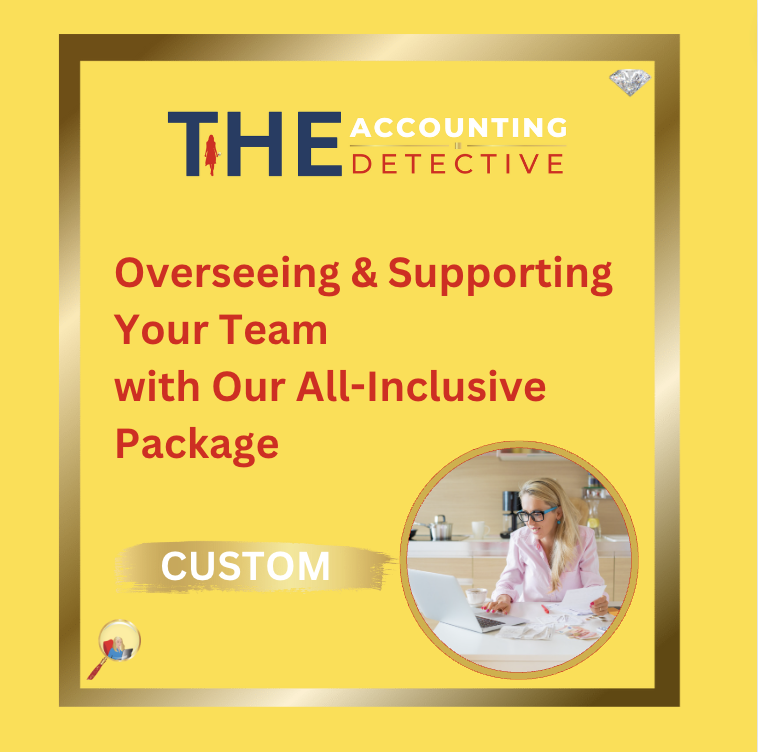9 Accounting Tips for Medical Offices and Medical Spas
Bookkeeping for medical offices and spas can be complex due to the nature of their business activities, especially if they select a cash base accounting method. Here are some key accounting considerations to help you run your business.

Medical Offices
The Accounting Detective
Let’s assume, that accounting wasn’t part of the curriculum when you went to medical school. But now, as the owner of a medical practice, it’s one of many business functions you need to figure out to ensure that your medical office is profitable and in compliance. Medical practice accounting is different from accounting for other types of businesses. You don’t just need to account for patient payments—you also need to deal with insurance compliance and government-backed programs like Medicare and Medicaid. Here are some key accounting considerations to help you run your business.
First, you must decide on the accounting method for your medical office or medical spa. Your medical group can use two types of accounting to track revenues and expenses: accrual accounting or cash-basis accounting. With cash-basis accounting, revenue is recognized when you receive payments from patients and clients, and expenses for the medical practice are recorded when you pay them. This method doesn’t use accounts receivable or accounts payable.
If you choose accrual basis accounting, your practice recognizes revenues when you earn them and expenses when you incur them—even if the payments haven’t come in or gone out yet. In other words, you record income on your books when you provide services to patients, regardless of when the insurance company or other third party pays your invoice. Most healthcare providers use cash basis accounting to manage and track their financials. It is easier to use than the accrual method. Still, it’s also the preferred method for tax professionals to report income/profits on income tax returns. The business can avoid paying taxes on the revenue it hasn’t received yet.
Streamline Your Accounting Processes for Increased Efficiency
Efficient accounting is crucial for the success of any business. By streamlining your accounting processes, you can save time, reduce errors, and ultimately improve your overall financial management. Let’s explore some additional strategies to further enhance the efficiency of your accounting practices.
One effective method to streamline your accounting processes is by implementing automated workflows. With the help of accounting software that integrates seamlessly with your practice management system, you can simplify and automate various tasks. This includes generating invoices, tracking expenses, and reconciling bank statements. By automating these processes, you can eliminate the need for manual data entry, reducing the likelihood of errors and saving valuable time.
In addition to utilizing accounting software, integrating cloud-based solutions into your accounting processes can provide numerous benefits. Cloud accounting software offers flexibility and real-time access to your financial data, allowing you to monitor your practice’s financial performance from anywhere, at any time. This level of accessibility enables you to make informed decisions promptly, whether you’re in the office or on the go.
Furthermore, cloud-based solutions offer enhanced collaboration capabilities. With multiple users having simultaneous access to the same financial data, you can easily collaborate with your team members, accountants, or financial advisors. This promotes efficient communication and ensures that everyone is on the same page when it comes to managing your practice’s finances.
Another aspect to consider when streamlining your accounting processes is the integration of electronic payment systems. By enabling clients to pay invoices electronically, you can speed up the payment collection process and reduce the need for manual handling of checks or cash. This not only saves time but also minimizes the risk of errors or misplacements.
Moreover, implementing regular financial reporting and analysis can help you identify areas where you can further streamline your accounting processes. By closely monitoring your practice’s financial performance through various reports, you can identify trends, spot potential issues, and make data-driven decisions to improve efficiency.
In conclusion, streamlining your accounting processes is essential for increased efficiency and improved financial management. By utilizing accounting software, cloud-based solutions, automated workflows, electronic payment systems, and regular financial reporting, you can optimize your accounting practices and focus on growing your business.
Medical Offices:
1. Medical Billing and Revenue recognition
Medical offices need to ensure accurate billing and revenue recognition to comply with regulatory requirements and avoid compliance issues. Revenue recognition in healthcare accounting can be a complex process. Healthcare providers generate revenue through a range of sources, including patient services, insurance reimbursements, and government funds, each with its unique regulations and requirements regarding when and how to recognize revenue. Services rendered are when a patient receives healthcare services, and revenue is recognized based on the fair value of services provided at the time of service provision. This value is typically based on the rates that healthcare provider charges third-party payers.
2. Inventory Management
Medical offices must manage inventory effectively, especially if they have a pharmacy or in-house laboratory. They must track inventory levels, expiration dates, and follow-up supplies to minimize waste and optimize profitability.
3. Accounts Receivable Management
Medical offices need to manage Accounts Receivables effectively to improve cash flow. They should establish clear payment terms, follow up on overdue payments, and provide patient-friendly payment options.
4. Insurance and Payer Contracting
Medical offices must keep up with changing insurance and payer rules and regulations to comply. They should negotiate pay rates with insurance providers to ensure fair reimbursement for services rendered.
5. Tax Compliance
Medical offices must comply with federal, state, and local tax requirements. They should stay updated with tax rules and regulations, which may differ based on the state, and hire a professional with experience in tax preparation and accounting.
Medical Spas:
6. Inventory Management
Medical spas must manage inventory carefully, track usage, and purchase inventory- stock as needed to improve profitability and avoid expenditures during the month. They should address the expiration dates of products and ensure they do not have expired products on the shelves. You can use Inventory management softwares to help you with this task.
7. Accounts Receivable Management
Medical spas must manage Accounts Receivable effectively. They should establish clear payment terms and follow up on overdue payments.
8. Pricing
Medical spas should adequately price their services and products to cover their overhead costs and improve profitability.
9. Tax Compliance
Medical spas must comply with federal, state, and local tax requirements. They should stay updated with tax rules and regulations, which may differ based on the state, and hire a professional with experience in tax preparation and accounting.
Implement a System for Tracking Accounts Receivable and Payable
To maintain a healthy cash flow, it’s essential to have a robust system for tracking accounts receivable and payable. Use accounting software that allows you to generate invoices and track payments from patients or insurance providers. This will help you stay on top of outstanding balances and ensure that all payments are received in a timely manner. Implementing a system for tracking accounts receivable involves more than just using accounting software. It requires careful attention to detail and a proactive approach to managing your practice’s finances. By implementing best practices, you can improve cash flow and maintain a positive financial position.
One important aspect of tracking accounts receivable is generating accurate and timely invoices. Make sure your accounting software allows you to customize invoices to include all necessary information, such as patient details, services rendered, and payment terms. This will help reduce confusion and ensure that patients understand their financial obligations. In addition to generating invoices, it’s crucial to monitor outstanding balances and follow up on overdue payments. Implement a system that sends automated reminders to patients or insurance providers when payments are due. This will help minimize the risk of payment delays and improve your chances of receiving timely payments.
Furthermore, consider offering convenient payment options to your patients. This can include online payment portals, credit card processing, or installment plans. By providing flexible payment options, you can make it easier for patients to settle their outstanding balances and reduce the likelihood of unpaid invoices.
Similarly, tracking accounts payable is equally important. This involves managing payments to suppliers, vendors, and other business partners. Keep track of payment due dates and take advantage of vendor discounts for early payments. By effectively managing your accounts payable, you can minimize late payment fees and improve your practice’s financial position. When tracking accounts payable, it’s essential to maintain accurate records of all purchases and payments. Implement a system that allows you to easily track and reconcile invoices, ensuring that all payments are accounted for. This will help you avoid duplicate payments or missed invoices, which can negatively impact your cash flow.
Additionally, consider establishing strong relationships with your suppliers and vendors. Regular communication and prompt payment can help build trust and potentially lead to better pricing or favorable terms. By maintaining positive relationships with your business partners, you can create a win-win situation that benefits both parties. Furthermore, take advantage of technology to streamline your accounts payable process. Many accounting software solutions offer features such as automated payment scheduling and electronic payment options. These tools can help reduce manual errors and save time, allowing you to focus on other aspects of your practice.
Establish an Effective System for Recording Receipts and Payments
Accurate recording of receipts and payments is fundamental to maintaining a clear financial picture. It not only ensures that you have a reliable record of your financial transactions but also helps you make informed decisions about your practice’s financial health. In order to establish an effective system for recording receipts and payments, there are a few key steps you should consider.
First and foremost, it is essential to create a system for organizing and filing physical receipts. This can be done by setting up a dedicated filing cabinet or folder specifically for receipts. Within this system, you can further categorize receipts based on different expense categories or time periods. For example, you may choose to separate receipts for equipment purchases from those for payroll expenses. By organizing your physical receipts in this manner, you will be able to easily locate and retrieve specific records when needed.
In addition to organizing physical receipts, it is also worth considering digitizing them. This can be done by scanning or photographing each receipt and storing them electronically. There are numerous software applications and mobile apps available that can help you with this process. Digitizing your receipts not only reduces clutter in your office space, but also provides an extra layer of security against loss or damage. Moreover, it allows for easier and quicker access to your financial records, as you can search for specific receipts using keywords or filters.
When it comes to recording payments, it is crucial to be diligent about categorizing expenses. By creating specific expense categories relevant to your practice, such as equipment purchases, payroll, or marketing, you can ensure that each payment is accurately recorded and allocated to the appropriate category. This level of categorization not only helps you track your spending but also enables you to identify areas where you could potentially cut costs or reallocate resources. For instance, if you notice that a significant portion of your expenses is going towards marketing with limited return on investment, you may consider exploring alternative marketing strategies or reallocating those funds to other areas of your practice.
The Julianna Package offers a seamless solution for companies of all sizes facing the temporary absence of their Controller, Financial Director, or Bookkeeper due to maternity leave or any other reason. With a comprehensive duration of three months, this package ensures uninterrupted financial management by providing skilled professionals to cover crucial responsibilities during this period. Keep your financial operations running smoothly with “The Julianna Package”.
Elevate Your Financial Strategy and Empower Your Accounting Team


Train Employees to Properly Handle and Record Financial Data
Effective accounting practices rely on accurate and consistent record-keeping. Train your employees on proper financial data handling and recording procedures. Ensure they understand the importance of maintaining confidentiality and accuracy in financial transactions. Regularly review your employees’ work to identify any potential errors or gaps in their understanding. By investing in proper training, you can minimize errors and reduce the risk of financial discrepancies.
Create a Secure and Accurate System for Documenting Financial Information
Protecting sensitive financial information is vital in today’s digital age. Implement robust security measures to safeguard your practice’s financial data. This includes ensuring that your accounting software is updated with the latest security patches and using strong passwords for all accounts. Additionally, regularly back up your financial data to prevent loss in the event of a system failure or data breach. Consider using cloud storage services or external hard drives for secure data backup.
Accurate documentation is also essential for accounting purposes. Keep detailed records of all financial transactions, including invoices, receipts, and bank statements. This will facilitate audits, tax preparations, and financial analysis. Implementing these accounting tips will help medical offices and medical spas improve their financial management practices. By streamlining processes, tracking accounts receivable and payable, establishing effective record-keeping systems, training employees, and securing financial information, practices can optimize their accounting practices and ensure long-term success.
Controlling Expenses in Medical Practices and Spas
Controlling expenses in medical practices and spas is vital for maintaining profitability and financial stability. By implementing cost control strategies, you can optimize operational efficiency and minimize unnecessary expenditures. This can involve negotiating favorable contracts with suppliers or implementing energy-saving measures to reduce utility costs.
Regularly reviewing expenses and identifying areas where costs can be reduced or eliminated is another crucial aspect of expense control. It is essential to involve relevant staff members, such as practice managers or department heads, in these reviews to ensure a comprehensive evaluation. By monitoring expenses and implementing cost-saving measures, your practice can achieve greater financial viability and allocate resources to areas that drive growth and enhance patient care.
Benefits of Outsourcing Accounting for Medical Practices and Spas
Outsourcing accounting tasks can offer numerous benefits for medical practices and spas. By entrusting accounting responsibilities to professionals with expertise in the healthcare industry, you can free up internal resources and focus on core competencies. Outsourcing can also provide access to advanced accounting software and technology, which may otherwise be costly for a small to medium-sized practice. Furthermore, outsourcing accounting functions can reduce the risk of errors or fraud, as external accountants bring a fresh perspective and independent oversight. They can offer valuable insights and recommendations to improve financial operations and identify potential opportunities for cost savings. Additionally, outsourcing can ensure compliance with applicable accounting standards and regulations, providing peace of mind knowing that your practice’s financial records are accurate and complete.
Conclusion
Proper accounting is essential for the success of medical practices and spas. By establishing budgets and forecasts, streamlining accounting processes, and analyzing financial performance, you can make informed decisions that optimize your practice’s financial health. Implementing internal controls, managing accounts receivable efficiently, and controlling expenses further contribute to financial stability and profitability.
Considering the benefits of outsourcing accounting tasks, it may be worth exploring this option to leverage specialized expertise and streamline financial operations. By prioritizing sound accounting practices, medical practices and spas can ensure long-term growth, ethical financial management, and enhanced patient care.
It All Starts With a FREE consultation!
Every client’s needs are unique and require varying amounts of time and attention. You can use this form to let us know what you’re looking for, and we’ll reach out to you to schedule an appointment and talk about rates for your business needs.
Please be as detailed as possible with what work is needed, what industry your business is in, and where you are located.
Our team will contact you with in 2 business days to set up the first meeting. We will make sure all your needs are taken into account when selecting the package and type of services you need.


Stay In Touch